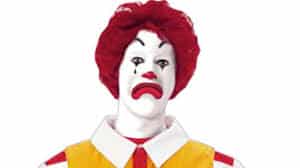Why do we still eat so poorly?
SEPTEMBER 6, 2014 LAST UPDATED: SATURDAY, SEPTEMBER 6, 2014, 1:21 AM
BY STEVE JANOSKI
STAFF WRITER
THE RECORD
Drive down most highways in North Jersey, and you’re guaranteed to come across one of two things: a curbside fast food restaurant trying to lure motorists into its drive-thru with promises of salt-, sugar-, and fat-laden goodness, or a big metal sign advertising that such a place lies just off the next exit.
Their food is awful for us — we all know this — but many of us pull in anyway.
Take a lunch made up of an offering from McDonald’s dollar menu, such as the McDouble. That burger has 380 calories, 17 grams of fat, 34 grams of carbohydrates, and 840 milligrams of sodium. Add a “medium” order of fries for another 340 calories, 16 grams of fat, 44 grams of carbohydrates, and 190 milligrams of sodium, and a large Coke at 280 calories and 76 grams of carbohydrates, and you’ve got a meal packing a whopping 1,000 calories, 33 grams of fat (10.5 grams of which is saturated), 154 grams of carbohydrates, and 1,030 milligrams of sodium. That’s 58 percent of the recommended daily fat intake, 51 percent of carbs, 43 percent of sodium and about half of our recommended daily intake of calories, all in one heart-clogging, gut-busting meal.
And what’s the reward? Feelings of guilt and a waistline that never shrinks: According to the Center for Disease Control and Prevention, 70 percent of American adults now qualify as overweight, and of those, 35 percent are considered obese.
So why do we keep eating this way?
The problem, said Dr. Diego Coira, chairman of the Department of Psychiatry and Behavioral Medicine at Hackensack University Medical Center (HUMC), begins with one of the medical field’s favorite culprits: stress. When we’re under physical or emotional stress — not uncommon for our fast-paced lives — the body releases cortisol, a hormone that causes our appetite to increase (even if we ate a short time ago) and causes “stress eating.” And the combination of salt, sugar, and fat that’s found in many of the worst foods is, unfortunately, psychologically and physically comforting, even if it’s unhealthy.
“They’re called ‘comfort foods’ because they help when you’re stressed — they calm you down, the brain releases endorphins and dopamine after you eat them, and you’re good,” Coira said
– See more at: https://www.northjersey.com/news/health-news/why-do-we-still-eat-so-poorly-1.1082177#sthash.YhQJrsyz.dpuf


Let the truth be known.
Most of us live to eat. The emphasis on fattening food in the media and supermarkets is tremendous. And it influences our eating habits.
In order to come up to current eating standards we have to be eating “delicious” meals in restaurants or preparing them at home. And delicious is almost always synonymous with too many calories, and delicious with fat, salt, and sugar.
In a recent column . Comfort Food, in the NYT, Mark Bittman, food expert, said he often eats steamed veggies with pasta or rice for his comfort food at mealtimes. I was shocked. I thought he would confess to cooking up rich, gooey complicated meals.
Bittman is best advice as far as I am concerned. By the way, let’s chuck the store bought granola bars. They instill the sugar , fat cravings. Make your own and see the slimming results.